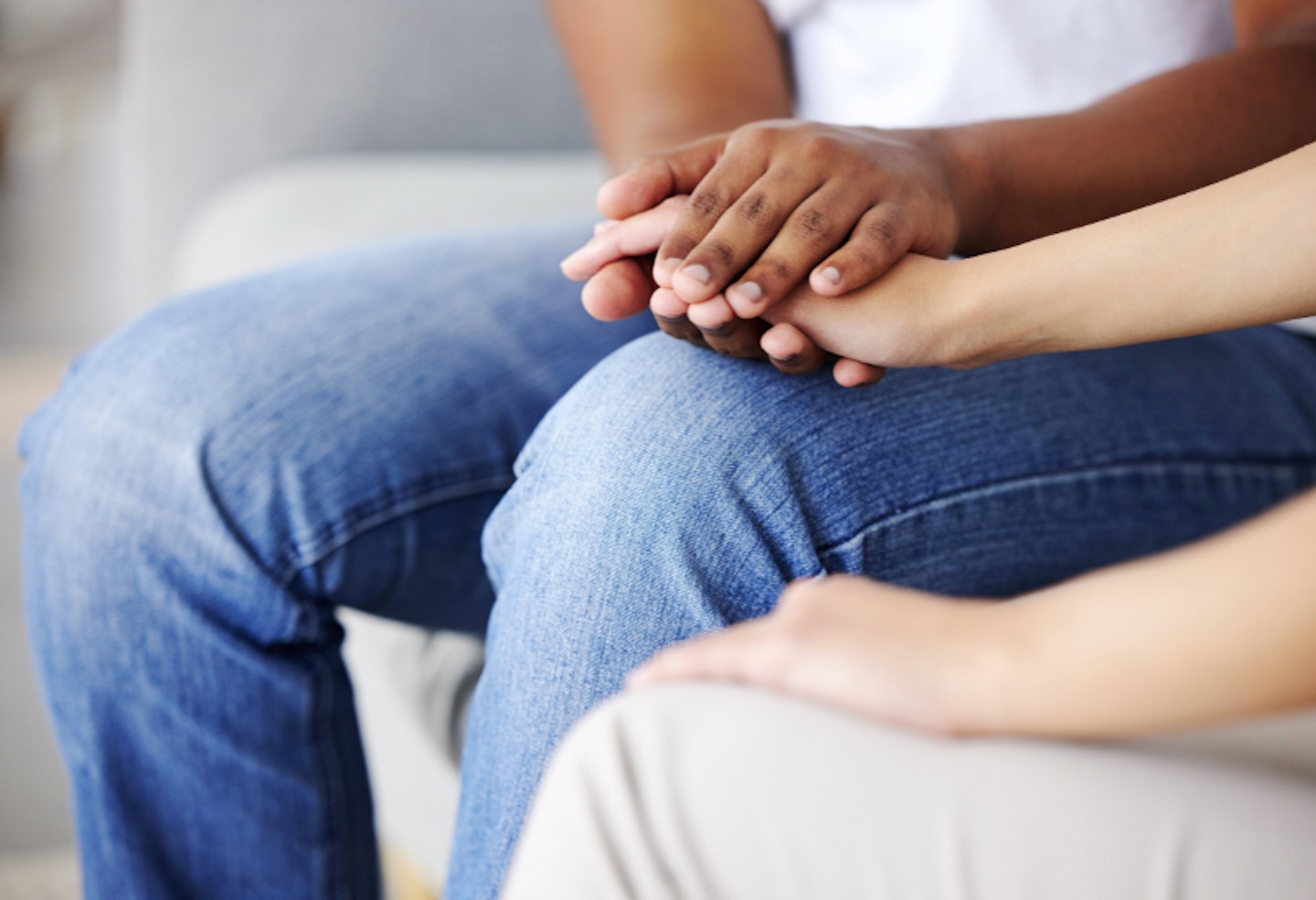However it happens, losing a baby is one of the most devastating and traumatic events someone can go through. Your whole world suddenly changes in a split second. If you are a friend or family member of someone who has lost a baby and you have not experienced it for yourself, it can be hard to know what to do or say to support friends or family after baby loss. You want to get it right, but what if you get it wrong?
Emiliana Hall, founder of The Mindful Birth Group® and birth and postnatal doula, shares a guide on how to approach caring for your loved one during this time.
Listen
This may surprise you, but you do not need to say a lot to someone who has experienced baby loss. Just be with them and be guided by them. If they want to talk, simply listen. Don’t feel as though you need to respond to what they are saying and fix anything or make them feel better. Being able to talk and be listened to can be extremely therapeutic in itself. You can’t ‘make’ them feel better, and that is OK.
If they don’t want to talk, don’t take that personally or fret that they ‘should’ be talking more. Sometimes you just being there is enough to support friends or family after baby loss. However, just keep giving them the opportunity to talk and if/when they are ready to, they will. Sometimes it can help to speak to someone you don't know so you may wish to share support resources outside of family and friends that they may find useful.
Partners need support too, and being there to listen to their own experiences and feelings is important as they may need somewhere safe to talk to. Often they feel that they need to ‘hold up the fort’ but that isn’t sustainable when they are also suffering from losing their baby too.

Acknowledging the baby
As time goes on, people can start to think that the baby is in the ‘past’, but for lots of parents, they never leave their minds. If you're supporting someone after stillbirth or miscarriage, it's important to acknowledge and ask the parents about how they are feeling about their baby. This can be much more comforting than ‘not’ talking about them.
The Lullaby Trust says that using their baby’s name, if they named them and have shared it with you, is a good way to be supportive when talking about their baby loss. It is important to give parents the space to talk about their experience if they wish to and again, listening rather than trying to reply to everything they are saying, unless they are asking you a question or for your thoughts, is always helpful.
Offer practical help
Giving the parents space to grieve and staying away can feel like the natural thing to do. However, taking them food, offering to walk the dog, playing with an older sibling or taking them to the park- anything that helps to lighten the load can be incredibly comforting. Imagine these gestures as a big invisible hug enveloping them.
However, be clear with your offers of help. For example, rather than saying ‘Can I do anything to help?’ be more specific and ask ‘would you like me to walk the dog today’ or ‘I’m making a batch of stew, I can drop some round for you later?’
Losing a baby at any point can feel extremely lonely and so knowing people are there thinking of them and looking after them can be very comforting. If the parent has been through labour or birth of any kind, they will be needing to physically recover from this too. Think about how you can do things that will enable them to rest. However, remember not to clear or throw anything away without first checking. It might seem helpful to clear baby equipment, cards or photos away but having them around might be comforting. Always check with the bereaved parents before moving anything if you are helping today round the house.
Be understanding
If you are pregnant or have children of your own, understand that parents who have lost a baby can often find it very tough to be around mums-to-be or little ones or to attend events such as baby showers, christenings or birthday parties. This doesn't mean you shouldn't extend the invitation but instead, gently acknowledge that you appreciate they may not wish to come.
Similarly, if you are personally struggling with parenting and could do with offloading, it's worth looking for support elsewhere as it's understandable they may resent your feelings at this time. That said, you should take the lead from the parent themself as some may take comfort in being surrounded by children.
What not to say
You should steer clear of anything that devalues their baby or how they are feeling. For example, “It wasn’t meant to be”, or “these things happen for a reason”. The pain of losing a baby is not something that should ever be brushed over. Also, avoid referring to the baby as 'it,' even if they have not been named.
It is best not to use 'at least' phrases, such as 'at least you are young,' or 'at least you can conceive,' or, if they have older children, 'at least you have other children.' They are not helpful and will not ease the pain of losing a baby.
Even if you are curious if the parents are going to try for another baby, this delicate subject matter should not be bought up unless the parents themselves do so in which case you should remember that another child won't be a replacement.
Remember the baby
For many of us, grief will always stay with us in some way or other and "moving on" is not a quick or straightforward process, nor is it always even possible. In the future, it can be helpful to reach out to parents on certain dates such as birthdays, due dates, anniversaries, Baby Loss Awareness week and Mother's or Father's Day to let them know you are thinking about them. Again, this will be individual to every parent as to whether it is something they would personally want, but do keep checking in with them.
Be led by the parents and be there for them as they need you to be. It’s likely they will need you, in some way or another.

What to send a friend who has lost their baby?
It might be that just being there is enough, but if you can't be with your friend or family member then sending something to let them know you are thinking of them is a nice idea. Flowers can be sent which will show how much you care and that your thoughts are with them. However, sending a care package is a good idea, it could include items that might be useful such as food, tissues, or toiletries they might need, as well as items like candles for relaxation.
If you don't feel sending a gift or flowers is the right thing for your friend or family member and while you can't be there, a card expressing your thoughts and condolences will be enough. It can be comforting to receive a card with kind words from a friend, and a baby loss card message could include condolences and sympathy, as well as an acknowledgement of the love they had for their baby, and also to let them know they are not alone and they are loved too. You can also include a comforting baby loss quote.
What do you say when someone loses their baby after birth?
Sometimes you don't need to say anything and your presence, or your thoughts expressed in a card, will be enough. However, to support friends or family after baby loss, you can say that you are there for them when they need, acknowledge their loss and use their baby's name, if possible. It is hard to know what to say to a parent after baby loss, but tell them simply that you are sorry for their loss and allow them time to talk (if they want to). Always be conscious that the mum will also be physically recovering from birth and will be tired and sore, so offer to help around the house and ask how they are feeling.
Support by funding research into baby loss
You might feel like you want to show your support by raising money in the baby's memory, or to raise awareness for baby loss and Baby Loss Awareness has some ideas including virtual events or getting your street to light up pink or blue. Always check with your friend or family member first, but if they are happy for you to raise funds to support research then you could join an event such as a walk or run dedicated to your friend, or hold your own event, like a coffee morning, to raise money.
Information and support
Supporting a friend or family member after baby loss can be hard for you, and it's not always easy to know what to do or say, or if you are being helpful. Plus, it is upsetting for everyone, including you, so finding out more about how to support a friend or family member after baby loss, or getting support for yourself can be useful. We have listed some places below where you can reach out for information or support for anyone affected by baby loss.
Aching Arms - A charity to provide support if you've lost your baby during pregnancy or birth or soon after.
The Lullaby Trust - Provides support for anyone after the sudden loss of an infant
Child Bereavement UK - Provides support, information and training for everyone affected when a baby or child dies.
Petals - Provides counselling after baby loss
Sands - Run by and for parents who have experienced the death of a baby at birth or shortly afterwards
Cruse Bereavement Care - Provides support, information and advice to anyone who has been bereaved to help them understand their loss
Lily Mae Foundation - Supports parents and families after a stillbirth, neonatal death, miscarriage or medical termination
Tommy's - The Pregnancy and Baby charity provides baby loss information and support
About the expert
Emiliana Hall is the founder of The Mindful Birth Group® and continues to teach Mindful Natal® courses and support families as a birth and postnatal doula and hypnobirthing expert. It's a topic she's been passionate about since 2014 since the birth of her first baby. Emiliana also has training in dealing with trauma around birth, baby loss. As well as having a passion about training and supporting families through their birth prep, she also became a surrogate for her close friends. She lives in Tring in Hertfordshire with her husband and two young children.
A journalist since 2015, Emily Gilbert is the Features & Reviews Editor for Mother&Baby and has written for the website and previously the magazine for seven years. Emily writes about everything from the top baby products to pregnancy, fertility and maternal mental health. Specialising in product reviews, Emily is the first to know about all the exciting new releases in the parenting industry.
